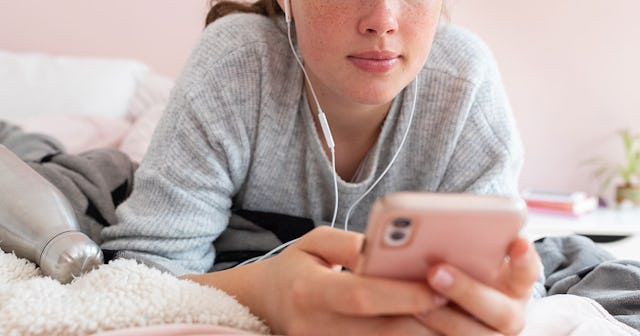Instagram Is 'Distinctly Worse' For Teens Than Other Forms Of Social Media

A Facebook whistleblower has come forward to offer an insight to the inner workings of the social media giant
God, it’s so hard to be a teenager. Especially for girls. What can (and should) be a beautiful time when a girl learns more about the world and her place in it can often turn into a cycle of self-doubt.
Frances Haugen, who used to work at Facebook until May of this year has come forward with a cache of research she undertook during her time at the company.
Haugen appeared on 60 Minutes to discuss how the company “chose to optimize for its own interests, like making more money.”
“One of the Facebook internal studies that you found talks about how Instagram harms teenage girls,” interviewer Scott Pelley said during the segment. “One study says 13.5% of teen girls say Instagram makes thoughts of suicide worse; 17% of teen girls say Instagram makes eating disorders worse.”
“And what’s super tragic is Facebook’s own research says, as these young women begin to consume this– this eating disorder content, they get more and more depressed,” Haugen said. “And it actually makes them use the app more. And so, they end up in this feedback cycle where they hate their bodies more and more. Facebook’s own research says it is not just the Instagram is dangerous for teenagers, that it harms teenagers, it’s that it is distinctly worse than other forms of social media.”
Haugen is a data scientist from Iowa with a degree in computer engineering and a Harvard master’s degree in business. For 15 years she’s worked for global companies including Google and Pinterest.
“I’ve seen a bunch of social networks and it was substantially worse at Facebook than anything I’d seen before,” Haugen told Pelley.
In the interview, Haugen said she secretly copied tens of thousands of pages of Facebook internal research. Haugen told 60 Minutes that the algorithm is the problem.
“So, you know, you have your phone. You might see only 100 pieces of content if you sit and scroll on for, you know, five minutes,” she explained. “But Facebook has thousands of options it could show you.”
Users will be shown content based on what type of material they have most engaged with in the past.
Here’s where it gets tricky, according to Haugen. “One of the consequences of how Facebook is picking out that content today is it is — optimizing for content that gets engagement, or reaction. But its own research is showing that content that is hateful, that is divisive, that is polarizing, it’s easier to inspire people to anger than it is to other emotions.”
“Facebook has realized that if they change the algorithm to be safer, people will spend less time on the site, they’ll click on less ads, they’ll make less money,” Haugen said in the interview.
“Facebook makes more money when you consume more content,” she continued. “People enjoy engaging with things that elicit an emotional reaction. And the more anger that they get exposed to, the more they interact and the more they consume.”
As the news of the whistleblower’s claims swept the news, both Facebook and Instagram experienced outages this morning. There is no word on what caused the outages but any break teens can have from checking Instagram sounds like a good thing based on this horrifying research.